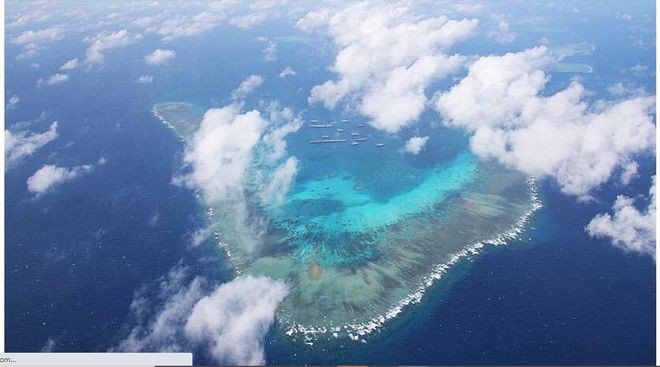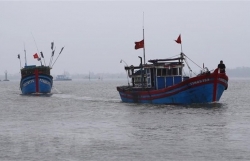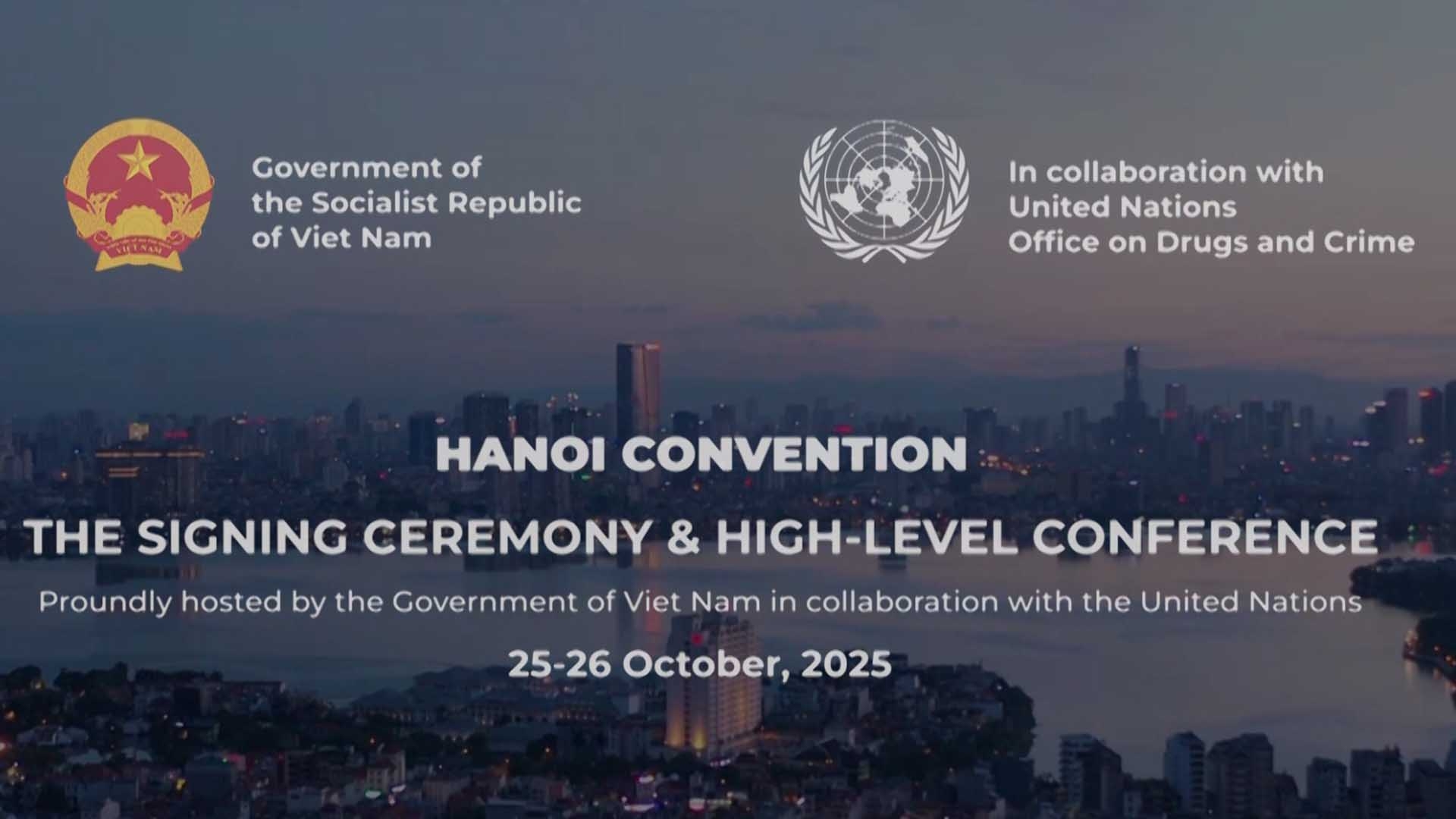
More than 200 Chinese vessels anchored in Whitsun Reef: International law violated and legitimate concern raised
Latest
 |
| Chinese ships were seen in Whitsun Reef within the Spratly archipelago under Vietnamese sovereignty on March 22. |
A large number of ships with dim purposes
In recent weeks, it has been reported that more than 200 Chinese vessels were seen anchored at the Whitsun Reef within the Spratly Islands. It was reported that these vessels did not involve in fishing activities.
Bearing in mind that the East Sea remains the field of conflicting land and maritime claims among six states (Brunei, China, Malaysia, Philipines, and Viet Nam), the fact that the purpose of the gathering was ambiguous has raised doubt and concern around the region.
Other states outside of the region, such as the United States and Australia, also expressed their concern over the event. Although these states are not the parties to the dispute in the East Sea, they have all right to worry about the suspicious gathering of Chinese vessels at the Whitsun Reef.
|
| East Sea disputes should be solved based on international laws: Ukrainian scholars |
It is because the East Sea is not only a regional sea in the sense that only the states bordering it have the interests in what happens in this body of waters. The East Sea is one of the busiest and most important maritime trade routes in the world. One-third of the world’s maritime shipping passes through it every year.
The security and safety of this route are thus essential to all states both within and beyond the region. This makes the stability of the East Sea an important interest of all states. They have the legitimate right to raise their voice if the stability is at risk.
Moreover, according to international law, including the United Nations Convention on the Law of the Sea (UNCLOS), all states enjoy the freedom of navigation and overflight in the area beyond the 12 nautical mile territorial sea of the coastal state.
Ships of all states are thus free to sail through most of the East Sea. All states have the lawful right not only to travel through the area but also to safely travel through it. Any act that may prejudice the security and safety of the navigation in the East Sea infringes the enjoyment of the rights of all states that have ships navigate through the area. They have the legitimate standing to raise their concern, and even to take appropriate actions if necessary, to protect their lawful rights and interests if they believe that a state has conducted risk acts.
It is worth noting that following the mass land reclamation and island-building activities of China in the Spratly Islands in recent years, the situation in the East Sea is increasingly complicated and tense. The dispute has become more and more sensitive to both states that are the parties to the dispute and those that have navigational interests in the area. Against this backdrop, it is wise for all states concerned to exercise self-restraint to avoid any conduct that may trigger “the sensitiveness” of other states and erose the mutual confidence between them.
From the perspective of international law
UNCLOS clearly stipulates the rights and obligations of the coastal state and other states in different maritime zones. The legality of the mass gathering of Chinese vessels at the Whitsun Reef is thus determined by reference to the legal regime of the Whitsun Reef.
According to satellite images and reports, the Whitsun Reef is likely a submerged reef or a low-tide elevation (some sand bars can be seen but they seem not to exist permanently to be considered as an island).
The legal regime of the reef is thus subject to the legal regime of the nearby high-tide feature. In the distance of 12 nautical miles is the Grierson Reef which is, in accordance with the 2016 arbitral Award in the East Sea Arbitration, a rock.
Article 121(3) of the UNCLOS provides that a rock has a territorial sea exceeding up to 12 nautical miles. It means the Whitsun Reef is within the territorial sea of the Grierson Reef and thus is subject to the sovereignty of the state that has sovereignty over the Grierson Reef – that is Viet Nam.
In the territorial sea, foreign ships enjoy the right of innocent passage. Ships of all states can navigate through the territorial sea of a coastal state if the navigation is continuous, expeditious, and uninterrupted.
Stopping and anchoring are not allowed unless the ship encounters unexpected incidents or are necessary due to force majeure or distress or to give assistance to persons, ships, or aircraft in danger or distress. Simply put, a ship exercising the right of innocent passage is required not to stop or anchor except objective circumstances force it to do so.
|
| Australia affirms continued support for freedom of navigation in East Sea |
Back to the case of the mass gathering of Chinese vessels in the Whitsun Reef, it seems there is no such objective circumstance. The spokesperson of China’s Ministry of Foreign Affairs explained on April 1 that the vessels were taking shelter “from rough sea conditions”.
However, the Defense Minister of the Philippines rejected the explanation. He said in a statement released on April 3 that “the weather has been good so far, so the vessels have no other reason to stay there.” It seems the weather reason is not convincing.
No other evidence is available to suggest that Chinese vessels faced circumstances that forced them to anchor at mass within the territorial sea of Viet Nam at the Whitsun Reef. Violation is established! Viet Nam has the right to take all necessary and appropriate measures at its disposal to put an end to the mass gathering.
One interesting point is worth noted here. The spokesperson of China’s Ministry of Foreign Affairs stated that they are civil fishing vessels. Some reports characterized them as Chinese maritime militia.
Regardless of the identity of the vessels, it is hard not to agree that these vessels should have not dared to anchor at mass in the hotly disputed area in the East Sea, and quite near a military base of a competing state without the patrol and direction from governmental organs of China. The acts of these vessels are thus attributable to China under international law of state responsibility.
Negative impacts beyond the incident
The mass gathering is not only a violation of the 1982 UNCLOS but also has negative impacts in a broader context.
As noted above, states concerned are very sensitive to the East Sea dispute. States should restraint to conduct any activity that may disturb the status quo of the dispute.
Unfortunately, during recent years, China has taken a series of acts that changed significantly the status quo. The image of China is thus damaged. It is now considered as the problem maker while other states parties to the dispute are seen as trying their best to keep the status quo. It is clear from the mass gathering: it is China who took a risky act while other states did nothing not allowed by the law!
The good faith and self-restraint of other states' parties seem to be abused. That feeling may likely erose their confidence in working with China to reach a mutually acceptable solution for dispute management in the East Sea.
The Code of Conduct (COC) being negotiated between ASEAN and China to provide a framework that protects and promotes the stability and security in the East Sea may be slowed down. This is not desirable. Having a binding and effective COC is beneficial for ASEAN and China. It is also beneficial for other states outside of the region to have a safe and secure maritime route through the area.
It is hoped that all states concerned should have a common understanding of the need for self-restraint so we will not have to see such a risky activity as that of the mass gathering at the Whitsun Reef in recent weeks.



















